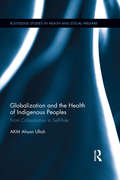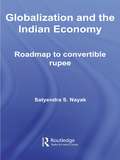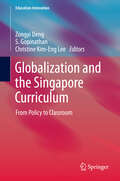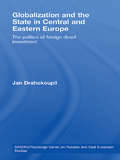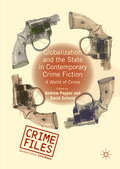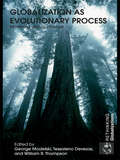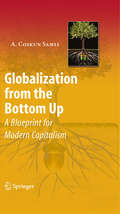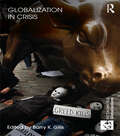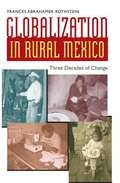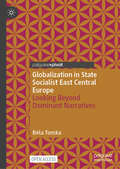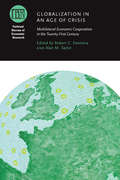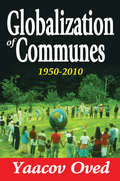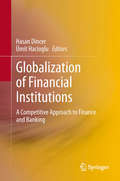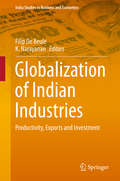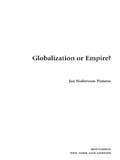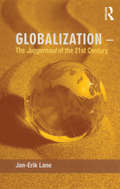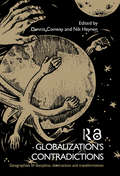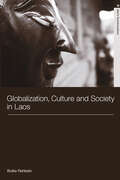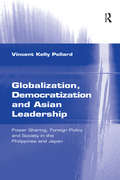- Table View
- List View
Globalization and the Gulf
by John W. Fox Nada Mourtada-Sabbah Mohammed Al-MutawaFor centuries, the Arabian Gulf has been a crossroads where seafaring people and Bedouins alike travelled great distances transacting business. Events of the past few years, both good and bad, have directed the world’s attention to the Arabian Peninsula, where a rich cultural tradition is rapidly incorporating the latest innovations from around the world. This is the process of globalization. New economies create enormous potential, but it will require great care for the people of the region to steer through a period of profound change. Political and economic interests intent on maintaining the flow of petroleum products on one hand, and people in the Gulf region who assess their won interests from quite a different perspective, on the other, exert pressures from conflicting directions. Reconciling these interests in a time of rapid globalization poses enormous challenges. This timely volume brings together the work of scholars from both the Middle East and the West who have the expertise to evaluate the interaction of new ideas, new technologies and new economies. Brought together by the American University of Sharjah and the Sociological Association of the UAE, the contributors reflect on both the process of globalism and on the traditions of Gulf society and culture, offering views on how these trends interact within the global system.
Globalization and the Health of Indigenous Peoples: From Colonization to Self-Rule (Routledge Studies in Health and Social Welfare)
by Ahsan UllahIn 70 countries worldwide, there is an estimated 370 million indigenous peoples, and their rich diversity of cultures, religions, traditions, languages and histories has been significant source of our scholarships. However, the health status of this population group is far below than that of non-indigenous populations by all standards. Could the persisting reluctance to understand the influence of self-governance, globalization and social determinants of health in the lives of these people be deemed as a contributor to the poor health of indigenous peoples? Within this volume, Ullah explores the gap in health status between indigenous and non-indigenous peoples by providing a comparative assessment of socio-economic and health indicators for indigenous peoples, government policies, and the ways in which indigenous peoples have been resisting and adapting to state policies. A timely book for a growing field of study, Globalization and the Health of Indigenous Peoples is a must read for academics, policy-makers, and practitioners who are interested in indigenous studies and in understanding the role that globalization plays for the improvement of indigenous peoples’ health across the world.
Globalization and the Human Factor: Critical Insights
by Joseph MensahSince the 1980s, the world has experienced an unprecedented push towards economic, political, social, cultural, financial and technological integration. This integration is a key element of the process of globalization. Much of this revolves around the tensions and conflicts inherent in globalization with emphasis on political economy but at the expense of the human factor (HF), which places people at the centre of all discussions about globalization. This volume brings the HF into the debate and examines to what extent this hitherto marginalized concept holds the key to providing a holistic understanding and contestation of globalization. The volume develops a distinct concept or framework of the human factor; examines the role and significance in global change from an interdisciplinary perspective; analyzes the extent and significance in contemporary globalization discourse; and provokes further debate about the unresolved disputes surrounding globalization. The account will help readers navigate the 'minefields' of the globalization debate.
Globalization and the Indian Economy: Roadmap to a Convertible Rupee (Routledge Studies in the Growth Economies of Asia #Vol. 80)
by Satyendra S. NayakThis book examines the impact of globalization on the Indian economy, exploring the trade, investment and financial aspects of globalization, and also considering its implications for the balance of payments and currency exchange rate. The first part of the book deals with the evolution of the philosophy of globalization and its impact on exchange rates, global liquidity, currency markets, and global trade and payments. It highlights the catalytic role played by the US in driving the globalization process, and provides detailed analysis of the evolution of the international monetary system to illustrate current processes of globalization. Furthermore, a critical discussion of the Asian financial crisis of 1997 is presented as well as the lessons that have emerged from the crisis. The Indian economic experience and its own policy of dealing with globalization is the focus of second part of the book. The author examines the genesis of economic reforms and liberalization in India. The success of the Indian policy of gradualism is discussed in the context of the Asian crisis, and the reasons as to why India averted a similar crisis are explored. Finally, the author examines whether the Indian currency, the rupee, can be made fully convertible. This book makes a valuable contribution to the literature on globalization and development and should be of interest to academics interested in the global economy, international finance, international development and also to academics with an interest in South Asian Studies.
Globalization and the Politics of Development in the Middle East
by Clement Moore Henry Robert SpringborgIn a new edition of their book on the economic development of the Middle East and North Africa, Clement Henry and Robert Springborg reflect on what has happened to the region's economy since 2001. How have the various countries in the Middle East responded to the challenges of globalization and to the rise of political Islam, and what changes, for better or for worse, have occurred? Utilizing the country categories they applied in the previous book and further elaborating the significance of the structural power of capital and Islamic finance, they demonstrate how over the past decade the monarchies (as exemplified by Jordan, Morocco, and those of the Gulf Cooperation Council) and the conditional democracies (Israel, Turkey, and Lebanon) continue to do better than the military dictatorships or "bullies" (Egypt, Tunisia, and now Iran) and "the bunker states" (Algeria, Iraq, Libya, Sudan, Syria, and Yemen).
Globalization and the Post-Creole Imagination: Notes On Fleeing the Plantation
by Michaeline A. Crichlow Patricia NorthoverGlobalization and the Post-Creole Imagination is a major intervention into discussions of Caribbean practices gathered under the rubric of "creolization. " Examining sociocultural, political, and economic transformations in the Caribbean, Michaeline A. Crichlow argues that creolization--culture-creating processes usually associated with plantation societies and with subordinate populations remaking the cultural forms of dominant groups--must be liberated from and expanded beyond plantations, and even beyond the black Atlantic, to include productions of "culture" wherever vulnerable populations live in situations of modern power inequalities, from regimes of colonialism to those of neoliberalism. Crichlow theorizes a concept of creolization that speaks to how individuals from historically marginalized groups refashion self, time, and place in multiple ways, from creating art to traveling in search of homes. Grounding her theory in the material realities of Caribbean peoples in the plantation era and the present, Crichlow contends that creolization and Creole subjectivity are constantly in flux, morphing in response to the changing conditions of modernity and creatively expressing a politics of place. Engaging with the thought of Michel Foucault, Michel Rolph-Trouillot, Achille Mbembe, Henri Lefebvre, Margaret Archer, Saskia Sassen, Pierre Bourdieu, and others, Crichlow argues for understanding creolization as a continual creative remaking of past and present moments to shape the future. She draws on sociology, philosophy, postcolonial studies, and cultural studies to illustrate how national histories are lived personally and how transnational experiences reshape individual lives and collective spaces. Critically extending Bourdieu's idea of habitus, she describes how contemporary Caribbean subjects remake themselves in and beyond the Caribbean region, challenging, appropriating, and subverting older, localized forms of creolization. In this book, Crichlow offers a nuanced understanding of how Creole citizens of the Caribbean have negotiated modern economies of power.
Globalization and the Singapore Curriculum
by Zongyi Deng S Gopinathan Christine Kim-Eng LeeThis volume provides a multi-faceted and critical analysis of the Singapore curriculum in relation to globalization. First, it details reform initiatives established by the Singapore government to meet the challenges posed by globalization. Next, Globalization and the Singapore Curriculum presents how these reforms have been translated into programs, school subjects and operational frameworks and then examines, in turn, how well these have been implemented in schools and classrooms across the country. Through this examination, the book reveals how the initiatives, together with their curricular translation and classroom enactment, reflect on the one hand global features and tendencies and, on the other, distinct national traditions, concerns and practices. It brings to light a set of issues, problems and challenges that not only concern policymakers, educators and reformers in Singapore but also those in other countries as well. Written by curriculum scholars, policy analysts, researchers and teacher educators, Globalization and the Singapore Curriculum offers an up-to-date reference for postgraduate students, scholars and researchers in the areas of curriculum and instruction, comparative education, educational sociology, educational policy and leadership in Singapore, the Asia Pacific region and beyond. It also offers a vital contribution to the story of modern education around the globe: providing international students, scholars and researchers valuable insights into curriculum and curriculum reform for the 21st century.
Globalization and the State in Central and Eastern Europe: The Politics of Foreign Direct Investment (BASEES/Routledge Series on Russian and East European Studies)
by Jan DrahokoupilThis book examines the transformation of the state in Central and Eastern Europe since the end of communism and adoption of market oriented reform in the early 1990s, exploring the impact of globalization and economic liberalization on the region’s states, societies and political economy. It compares the different policies and national strategies adopted by key Central and Eastern European states, including the Czech Republic, Poland, Hungary and Slovakia, showing how initial internally oriented strategies of market reform, privileging domestic sources of investment, had by the late 1990s given way to externally oriented strategies emphasising the promotion of competitiveness by attracting foreign investment. It explores the reasons behind this convergence, considering the influence of internal and external forces, and the roles of interests, institutions and ideas. It argues that internationalization of the state is forged in the processes through which domestic groups linked to transnational capital attain domestic influence necessary to shape state policy and strategy. These groups — the comprador service sector in particular — constitute and organize political, social and institutional support of the competition state in the region. Overall, this book not only provides a detailed account of the political economy of post-communist transformation in Central and Eastern Europe, but also the processes by which states adapt to the forces of globalization.
Globalization and the State in Contemporary Crime Fiction
by Andrew Pepper David SchmidWhy has crime fiction become a global genre? How do writers use crime fiction to reflect upon the changing nature of crime and policing in our contemporary world? This book argues that the globalization of crime fiction should not be celebrated uncritically. Instead, it looks at the new forms and techniques writers are using to examine the crimes and policing practices that define a rapidly changing world. In doing so, this collection of essays examines how the relationship between global crime, capitalism, and policing produces new configurations of violence in crime fiction - and asks whether the genre can find ways of analyzing and even opposing such violence as part of its necessarily limited search for justice both within and beyond the state.
Globalization as Evolutionary Process: Modeling Global Change (Rethinking Globalizations #Vol. 10)
by William R. Thompson Tessaleno Devezas George ModelskiThe term globalization has gained widespread popularity; yet most treatments are either descriptive and/or focused on changes in economic interconnectivity. In this volume the concept is seen in broader terms as leading international experts from a range of disciplines develop a long-term analysis to address the problems of globalization. The editors and contributors develop a framework for understanding the origins and trajectory of contemporary world trends, constructing testable and verifiable models of globalization. They demonstrate how the evolutionary approach allows us to view globalization as an enterprise of the human species as a whole focusing on the analytical problem of global change and the rules governing those changes. The emphasis is not on broad-based accounts of the course of world affairs but, selectively, on processes that reshape the social of the human species, the making of world opinion and the innovations that animate these developments. Chapters are clustered into four foci. One emphasizes the interpretation of globalization as an explicitly evolutionary process. A second looks at historical sequences of such phenomena as population growth or imperial rise and decline as processes that can be modeled and not purely described. The third cluster examines ongoing changes in economic processes, especially information technology. A final cluster takes on some of the challenges associated with forecasting and simulating the complexities of globalization processes. This innovative and important volume will be of interest to students and scholars across the social sciences concerned with the phenomenon of globalization.
Globalization from the Bottom Up
by A. Coskun SamliTakes a proactive approach to addressing big issues of world poverty, economic development, and the impact of globalization -- with recommendations for business leaders, policymakers, and concerned citizens around the world Samli offers an alternative model, a philosophy and practice of "social capitalism" that is grounded in a bottom-up approach to wealth creation, while acknowledging that power will continue to be concentrated at the top level of the pyramid
Globalization in Crisis (ISSN #1)
by Barry K. GillsThis book analyses the present global financial and economic crisis, the most severe in nearly a century, and a wider set of multiple and converging crises with aspects and repercussions that go well beyond the current economic climate.Written by some of the world’s leading international scholars in the field of Globalization studies and related disciplines, this important collection addresses numerous key aspects of the relationship between Globalization and global crises, past, present, and future. It sheds new light and understanding on the concept and theory of Globalization and of ‘crisis’. The authors explore such issues as global finance and financial regulation, neoliberal ideology and policy, the ‘crisis of globalization’, the decline of Western hegemony, world systemic crisis, the moral crisis of ‘Western capitalism’, environmental and climate change crises, world order, hyper-violence and the international system, a crisis of the ‘global modern’ and a global civilisational and hostpric crisis, the rise of the global South, the historical dialectics of capital and social responses to crisis, the future of capitalism and the prospects for transformative alternatives. This book was published as a special issue of Globalizations.
Globalization in Rural Mexico: Three Decades of Change
by Frances Abrahamer RothsteinWhen the ever-intensifying global marketplace "modernizes" rural communities, who stands to gain? Can local residents most impacted by changes to their social fabric ever recover or even identify what has been lost?<P><P>Frances Abrahamer Rothstein uses thirty years of sustained anthropological fieldwork in the rural Mexican community of San Cosme Mazatecochco to showcase globalization's complexities and contradictions. <P> Rothstein's lucid work chronicles the changes in production, consumption, and social relations during three distinct periods: the Mexican "miracle," when economic development fueled mobility for a large segment of the population, including San Cosme's worker-peasants; the lost decade of the 1980s, when much of what had been gained was lost; and the recent period of trade liberalization and globalization, considered by many in Mexico and beyond as a panacea and a disaster at the same time.
Globalization in State Socialist East Central Europe: Looking Beyond Dominant Narratives
by Béla TomkaThis open access Palgrave Pivot explores four major aspects of globalization: foreign trade, capital and information flows, and the movement of people. The book examines how the state socialist countries of East Central Europe fit into the general trend of globalization after WWII. It focuses on three specific countries in the region: Poland, Czechoslovakia, and Hungary. The study also considers conceptual problems: whether recently introduced terms such as ‘alternative globalization’ and ‘socialist proto-globalization’ are plausible for interpreting state socialist globalization. Special attention is paid to the study of continuities and discontinuities in the process of globalization in East Central Europe, which is a key issue in current debates. This requires a long-term perspective, so the study covers not only the decades before 1989 but also subsequent developments. In doing so, the book attempts to find a balance between old and new mainstream interpretations: it recognises that East Central European societies experienced considerable globalization during the state socialist era; however, based on empirical findings, instead of ‘alternative’ or ‘proto-’ globalization, the book suggests other notions to conceptualise this process, including fragmentation, selectivity, and unevenness. Thus, the proposed understanding could also contribute to discussions on globalization beyond East Central Europe.
Globalization in an Age of Crisis: Multilateral Economic Cooperation in the Twenty-First Century (National Bureau of Economic Research Conference Report)
by Robert C. Feenstra Alan M. TaylorAlong with its painful economic costs, the financial crisis of 2008 raised concerns over the future of international policy making. As in recessions past, new policy initiatives emerged, approaches that placed greater importance on protecting national interests than promoting international economic cooperation. Whether in fiscal or monetary policies, the control of currencies and capital flows, the regulation of finance, or the implementation of protectionist policies and barriers to trade, there has been an almost worldwide trend toward the prioritizing of national economic security. But what are the underlying economic causes of this trend, and what can economic research reveal about the possible consequences?Prompted by these questions, Robert C. Feenstra and Alan M. Taylor have brought together top researchers with policy makers and practitioners whose contributions consider the ways in which the global economic order might address the challenges of globalization that have arisen over the last two decades and that have been intensified by the recent crisis. Chapters in this volume consider the critical linkages between issues, including exchange rates, global imbalances, and financial regulation, and plumb the political and economic outcomes of past policies for what they might tell us about the future of the global economic cooperation.
Globalization of Communes: 1950-2010
by Yaacov OvedAfter World War II, communes and cooperative communities became internationally oriented in their membership and networking began to develop. Unlike earlier such enterprises, these groups shared an openness to international relationships. This was evident both in the groups' social composition, and in the extension of networks beyond their own country. Such globalization opened up the possibility of comparative analysis, which has become a trend in research since the 1950s. The dynamism and speed with which voluntary communities have spread throughout the world is impressive. In the 1950s there were only a few hundred such societies, but by the end of the last century there were thousands. These have taken a variety of forms. There are religious and secular communes, intentional communities, ecological communities, co-housing projects, various types of Christian communities, communities of Eastern religions, and spiritual communities inspired by New Age thought. Yaacov Oved shows that such societies maintain a community based on cooperation and expand their influence through newspapers, television, and the Internet. Their chief characteristic is their openness to the outside world, and their search for a way to move beyond a world of individualism and competitiveness. To accomplish this, they embrace all the tools of the modern world. Oved observes that those who predicted the failure of communes and intentional communities failed to appreciate the extent to which people in today's society aspire to communal life. This book answers the doubters and does so with a sense of deep historical understanding.
Globalization of Financial Institutions
by Hasan Dincer Ümit HaciogluThis peer-reviewed volume from the Society for the Study of Business and Finance, discusses current issues in globalization and financial system from an international political and economic perspective. Contemporary instruments and actors in the global financial system are specially analyzed and the discussion of managerial and financial issues of the global financial strategies offers novelty to readers and researchers in the field.
Globalization of Indian Industries
by Filip De Beule K. NarayananThis book focuses on Indianmanufacturing industries and analyses the impact of inward foreign directinvestment on the domestic sector on the one hand, and exports and outwardforeign direct investment by Indian companies on the other. Although theemphasis is mostly general, specific industries, such as the automotiveindustry or the wind energy sector are also explored. The differences between lowand high technology industries are also addressed. In terms of theoretical settingand analysis, the book draws both from international business and industrial organizationliterature. The various characteristics of Indian industries, such as thedeterminants and impacts of R&D, the effects of spillovers, the drivers ofproductivity and technical efficiency are thoroughly researched employingappropriate quantitative methodologies that are relevant to the specific domainand topic under investigation. The book also focuses on the bearing ofpolicy on promoting manufacturing industries in India and is therefore ofinterest to researchers, industrialists and policy makers alike.
Globalization or Empire?
by Jan Nederveen PieterseIn this smart and concise examination of the trends driving contemporary globalization, Jan Nederveen Pieterse argues that the United States' pursuit of global primacy is based upon a complex melding of neoliberal economics and hegemonic politics. Do alternate capitalisms offer viable alternatives to the American way? Globalization or Empire? looks at globalization with acuity and thoughtfulness and uncovers its underlying dramas.
Globalization – The Juggernaut of the 21st Century: The Juggernaut Of The 21st Century
by Jan-Erik LaneWhile some people debate whether globalization really exists, it proceeds apace, affecting all societies. It presents us with unknown challenges and, as governments start to discuss what to do about these challenges, it is becoming obvious that globalization is not manageable. With globalization the juggernaut of the 21st century, all countries of the world become interdependent in relation to the coming energy crisis, climate change, the sharper cleavages between rich and poor countries and people, and the emergence of a multicultural social structure. This interesting and erudite book adopts a distinctive approach to the multiple dimensions of the globalization debate. The impressive coverage of philosophical thought - including Popper, Weber, Habermas, Lipset and Hobbes - makes a valuable contribution to the debates on globalization.
Globalization's Contradictions: Geographies of Discipline, Destruction and Transformation
by Nik Heynen Dennis ConwaySince the 1980s, globalization and neoliberalism have brought about a comprehensive restructuring of everyone’s lives. People are being ‘disciplined’ by neoliberal economic agendas, ‘transformed’ by communication and information technology changes, global commodity chains and networks, and in the Global South in particular, destroyed livelihoods, debilitating impoverishment, disease pandemics, among other disastrous disruptions, are also globalization’s legacy. This collection of geographical treatments of such a complex set of processes unearths the contradictions in the impacts of globalization on peoples’ lives. Globalizations Contradictions firstly introduces globalization in all its intricacy and contrariness, followed on by substantive coverage of globalization’s dimensions. Other areas that are covered in depth are: globalization’s macro-economic faces globalization’s unruly spaces globalization’s geo-political faces ecological globalization globalization’s cultural challenges globalization from below fair globalization. Globalizations Contradictions is a critical examination of the continuing role of international and supra-national institutions and their involvement in the political economic management and determination of global restructuring. Deliberately, this collection raises questions, even as it offers geographical insights and thoughtful assessments of globalization’s multifaceted ‘faces and spaces.’
Globalization, Agriculture and Food in the Caribbean
by Clinton L. Beckford Kevon RhineyThe last decade has seen a growing body of research about globalization and climate change in the Caribbean. This collection is a significant addition to the literature on a topic that is of critical importance to the region. It explores research from a number of Caribbean islands dealing with a range of issues related to agriculture and food in the context of globalization and climate change. Using a broad livelihoods perspective, the impacts on rural livelihoods are explored as well as issues related to community level resilience, adaptability and adaptations. The volume is strengthened by gendered analyses of issues and discussions informed by a diverse range of research methods and methodologies. Scholars of Caribbean studies and studies pertaining to social, cultural, economic and environmental issues facing Small Island Developing States (SIDS) will greatly benefit from this book.
Globalization, Culture and Society in Laos (Routledge Studies in Asia's Transformations)
by Boike RehbeinIncorporating original fieldwork carried out over a period of more than ten years, combined with innovative theoretical argument, Globalization, Culture and Society in Laos presents one of the first sociological investigations into modern Laos. Boike Rehbein gives a fascinating overview of contemporary Lao culture and society, whilst linking local and national phenomena to tendencies of globalization and the history of the region. The book introduces a new theoretical approach based on the sociology of Pierre Bourdieu, applying this sociology to the interpretation of Lao history. It also examines various aspects of Lao culture and society, including economics, politics, language, higher education, music, and religion. Rehbein concludes by attempting to synthesize these cultural elements with the impact of globalization to give a synopsis of contemporary Lao society. Written by an expert in Lao history and culture, familiar with the language and the people, this book will be of huge interest to students and scholars of Laos, Southeast Asia, social theory and globalization.
Globalization, Democratization and Asian Leadership: Power Sharing, Foreign Policy and Society in the Philippines and Japan
by Vincent Kelly PollardThe foreign policies of presidents, prime ministers and their foreign secretaries can be influenced by the preferences of domestic and international nongovernmental actors, as well as those of other governments. Representative democracy, media power, citizen activism and the globalization of politics and telecommunications, for example, have accelerated changes in the sharing of power. This book focuses on the Philippines and Japan where, willingly and unwillingly, foreign policy executives share power with individuals and groups inside and outside of government bureaucracies and their societies. The book retells the foreign policy narratives of regional cooperation, military relations and official development assistance (foreign aid), revealing how executive foreign policy makers and civil society organizations share power - and succeed or fail - in a globalizing, democratizing world. A variety of published, unpublished and declassified sources provide journalists, scholars, government practitioners and global citizens with a sophisticated understanding of the domestic politics of foreign policy making, as well as its intergovernmental and transnational side.
Globalization, Difference, and Human Security: Globalization, Difference, And Human Security (Interventions)
by Mustapha Kamal PashaGlobalization, Difference, and Human Security seeks to advance critical human security studies by re-framing the concept of human security in terms of the thematic of difference. Drawing together a wide range of contributors, the volume is framed, among others, around the following key questions: What are the silences and erasures of advancing a critical human security alternative without making recognition of difference its central plank?How do we rethink the complex interplay of human security and difference in distinct and varied spatial and cultural settings produced by global forces? What is the nexus between human security and the broader field of global development? What new challenges to Human Security and International Relations are produced with the rise of the ‘post-liberal’ or ‘post-secular’ subject? In what ways releasing human security from identification with the territorial state helps reconceptualize culture? How does Human Security serve as a subspecies of modern humanitarian thought or the latter reinforce imperial imaginaries and the structures of order and morality? Is the pursuit of indigenous rights fundamentally counterpoised to the pursuit of human security? What difference it might make to take the ‘doings and beings’ of communities-of-subsistence rather than basic-needs/wealth-seeking individuals as a point of departure in critical human security studies? How does reconstruction bind post-war and post-disaster states and societies into the global capitalist-democratic political structure?

